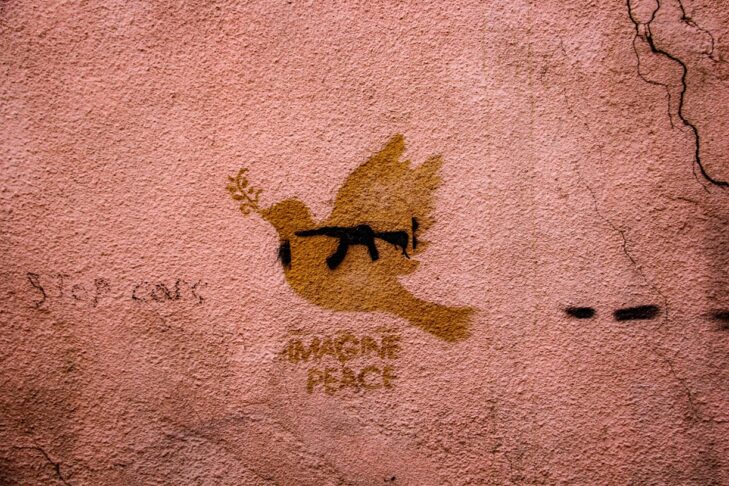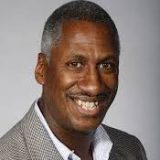On Oct. 7, when I saw the world’s reaction to the massacre in Israel, I was dumbfounded by the silence of some, the cheering of others, and the excuses and rationalization of still others for the crimes Hamas committed against humanity. I couldn’t believe righteous people had lost the ability to condemn sin and evil. It seemed as if Israel was alone on an island surrounded by enemies and hatred. A Ukrainian Jew said: “When Russia attacked Ukraine, people flew Ukrainian flags. When Hamas attacked Israel, people flew Palestinian flags.” When Russia attacked Ukraine, the U.N. condemned it, but the U.N. did not condemn Hamas’ attack on Israel.
I, like many Jews and Israelis, have no difficulty supporting Palestinian human rights and self-determination while also condemning the actions of Hamas. I’ve been puzzled as to why so many non-Jews can’t. It’s as if non-Jews have lost all moral clarity regarding this situation. I can condemn settler violence yesterday, the Oct. 7 massacre today, and something else tomorrow. It’s not that hard.
For some reason, I keep hearing the Mourner’s Kaddish in my head.
Antisemitism has been on the rise for years, but since Oct. 7, it has spiked alarmingly. As a result, Jews report being more self-conscious about being Jewish than ever before. Many have kept their children home from public school, avoided going to their synagogues, and tried to become less visibly Jewish, e.g., taking off a Star of David necklace or removing mezuzahs. In support of Israel, some wanted to fly the Israeli flag but feared communicating to enemies that Jews lived there.
With the FBI director testifying violent antisemitism is near an all-time high, I understand why Jews feel unsafe. It’s as if they have the curse of Cain on them, causing them to live in fear that whoever sees them will want to kill them.
As I considered the world’s reaction to Oct. 7, I concluded Israel has no natural friends or allies. Those on the far right, such as white nationalists, don’t like Jews or Israel, but neither do those on the far left who support anti-Zionism or dislike U.S. foreign policy in the Middle East as implemented through Israel. Poor whites who fly Confederate flags don’t like Jews, but neither do many rich gentiles, like Henry Ford. I still don’t understand why there wasn’t a boycott of Ford. For the last century, Blacks have allied with Jews on many issues, but not when it comes to the Palestinians. Remember, “From Ferguson to Palestine.” Neither Democrats nor Republicans are reliable allies. As Tom Lehrer sang, “Everybody hates the Jews.”
I now understood why Israelis embraced President Trump, who was described as Israel’s best friend and deeply antisemitic. Or why they welcome Christian Zionists, who support the nation of Israel but believe that all Jews will eventually be either converted to Christianity or killed. When you have so few friends in the world, you accept any who will help you today, even if you disagree with their eschatology.
It’s different for Blacks. We can usually count on support from Blacks from the African Diaspora, Hispanics, Democrats, liberal whites, various progressives, and college students. When one man, George Floyd, died, there were Black Lives Matter protests around the world. When 270 Jews died at the Re’im music festival, there was silence in the world’s capitals except for those protesting in support of the Palestinians. A few days later, people mistakenly thought Israel had bombed a hospital in Gaza, killing many Palestinian civilians. Again there were protests around the world. The only conclusion one could reach is that, unlike Black lives, Jewish lives don’t matter.
Blacks have often said non-Blacks can’t know what it’s like to be Black. On Oct. 7, I had an idea of what it was like to be a Jew: living in fear of unprovoked attacks, being self-conscious about being Jewish, and being unable to look to traditional institutions or allies for support.
I regret that it took me a lifetime to realize this, and I apologize to the Jewish community. Yes, I had seen documentaries on the Holocaust and was familiar with Facing History & Ourselves, but my mental model was that people with white skin (like Ashkenazi Jews) who lived in the suburbs, and looked like Barbie or Ken, were immune from discrimination and hatred. I didn’t know there was so much antisemitism in affluent suburbs, and when I learned about it, I didn’t understand it.
On Oct. 7, people said horrid things such as “about time” and “Israel is getting a taste of its own medicine.” Worse yet, these weren’t comments from white nationalists or the ignorant. These types of statements came from leaders at Ivy League colleges. It is a low bar to say a recognized terrorist organization committed terror and you condemn terrorism. It’s not the victims or perpetrators who make the Holocaust possible, it’s the bystander majority. The silence of the bystanders to the horror of Oct. 7 rightly scares those who remember the Holocaust.
Watching so many people fail to condemn obvious acts of evil shocked me. I couldn’t find words to describe what had happened. I won’t dignify it by calling it a war. In war, the Geneva Conventions apply and certain actions qualify as war crimes. It doesn’t even meet the definition of guerrilla warfare, as Hamas had no clear military objective. It wasn’t hunting, because hunting requires skill, unlike killing trapped women and children. It’s unfair to call the perpetrators animals, because animals don’t attack unless they themselves are attacked, fear being attacked, or are hungry.
The Oct. 7 attack was like a video game of horror where the players got points for every innocent life taken—more if they did it in some horrific and gruesome way. Live-streaming the horror to terrorize others earned them bonus points. I have a Jewish Israeli friend who tried to be fair, saying Hamas didn’t do anything to the Jews that the Jews hadn’t already done to the Palestinians. She was primarily referring to settler violence in the West Bank and abuses from the Israel Defense Forces toward Palestinians. For the sake of argument, let’s say she is correct. Nevertheless, I learned, “Two wrongs don’t make one right.” Or, as Mahatma Gandhi said, “An eye for an eye leaves the whole world blind.”
My liberal friends are making a mistake by giving Hamas a pass because they believe it advances Palestinian aspirations. Hamas doesn’t just hate Jews. Hamas is a terrorist organization that hates the West; is antidemocratic, anti-women, and anti-LGBTQ rights; and opposes religious freedoms—in theory, the values that liberals embrace. Not condemning Hamas’ actions only encourages its agenda and emboldens similar terrorists groups.
Soon after the Oct. 7 attack, when I gathered with a small group in the home of a Jewish friend to discuss how to support Israel during this difficult time, I felt as though I was sitting shiva.
Yitgadal v’yitkadash sh’mei raba…
Then I realized why the refrain of the Mourner’s Kaddish was in my head.
I wasn’t grieving the loss of Jewish and Palestinian lives so much as the death of the dream of peace held for so long by so many Jews, Muslims, and Christians. I was grieving future deaths, knowing another generation wouldn’t experience peace.
The fighting in Gaza perpetuates the lie that Jews and Arabs cannot live together in peace. Outside the West Bank and Gaza, about 18% of Israel’s population is Muslim, and beautiful, mixed cities such as Haifa are home to Jews and Arabs alike. There are Jewish/Arab and Jewish/Muslim families, and many Jewish-Palestinian organizations working to achieve peace. Jews trust armed Palestinians to guard their neighborhoods and homes. Peace is possible in Israel.
But the Israeli government, with the far-right Itamar Ben-Gvir as its national security minister, didn’t seem interested in discussing a pathway to peace before Oct. 7, and is certainly in no mood to discuss it now.
Israel’s strategy to destroy Hamas by destroying Gaza is making the world less sympathetic to Israel, which further fuels antisemitism and diminishes the likelihood of peace. The destruction of Gaza, the displacement of hundreds of thousands of Palestinians, and the humanitarian catastrophe for people without access to sufficient food, water, power, and health care seem less like a path to peace and more like Benjamin Netanyahu’s vendetta for being embarrassed on the world stage. Unconditional support for Israel is one thing, but it is another matter entirely to give Netanyahu unconditional support, especially when his decisions appear to threaten long-term peace and natural security.
As Sen. Chris Murphy has noted, for every terrorist killed, two more join the ranks. The living believe they need to avenge the dead. I fear that out of the ashes of Gaza will emerge Hamas 2.0, larger and more committed to the destruction of Israel than ever.
Even Abraham, who argued with God to spare Sodom and Gomorrah if 50 righteous people could be found there, would probably not support Israel’s destruction of Gaza as a step toward peace.
Yitgadal v’yitkadash sh’mei raba…
I am reminded of how the United States left Afghanistan—after spending billions of dollars and losing thousands of lives—only to see the Taliban return to power. Like Hamas, the Taliban espouses an ideology that no army can destroy.
In an appearance on CNN, Jordan’s Queen Rania stated, “The root cause of this conflict is illegal occupation. It is routine human rights abuses, illegal settlements, and disregard to U.N. resolutions and international law. If we do not address these root causes, you can kill the combatant, but you cannot kill the cause.”
Yitgadal v’yitkadash sh’mei raba…
I was grieving because Israel is such a beautiful country and the Jews, Christians, and Muslims who live there deserve better than occupation, intifada, and counterinsurgency. But now peace seems farther away than ever.
I felt as though I was sitting shiva for peace in Israel.
Throughout Israel’s history, from Egyptian captivity to the exile and through the destruction of the first and second temples, the prophets always had hope because they were able to see a future resurrection of life after death and destruction. As I experience my shiva moment for peace in Israel, like the prophets before me, I must have hope for a peaceful Israel and a life after death and destruction.
This post has been contributed by a third party. The opinions, facts and any media content are presented solely by the author, and JewishBoston assumes no responsibility for them. Want to add your voice to the conversation? Publish your own post here. MORE



